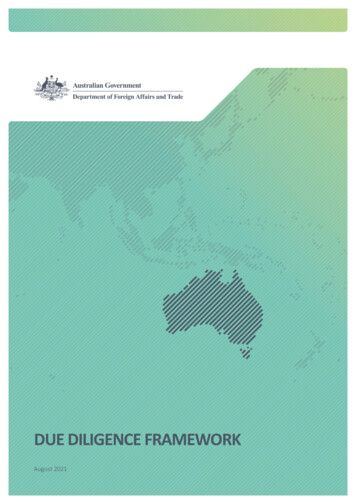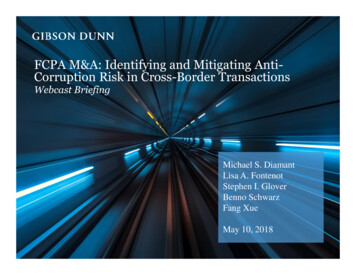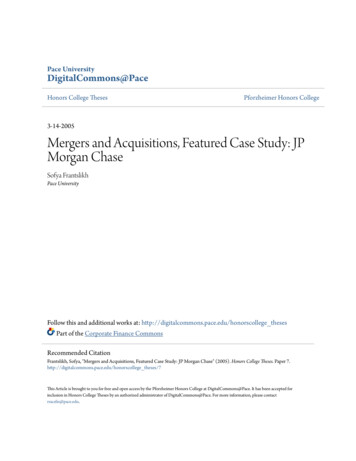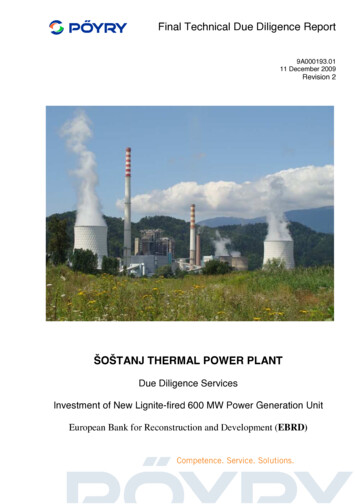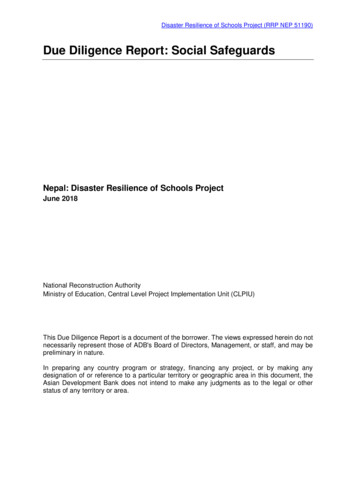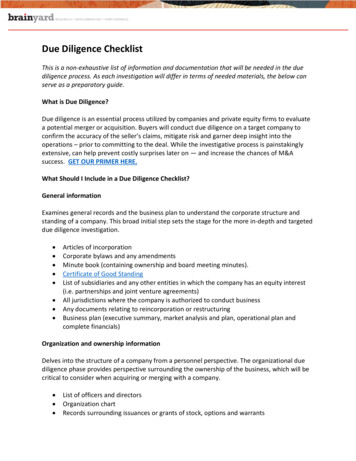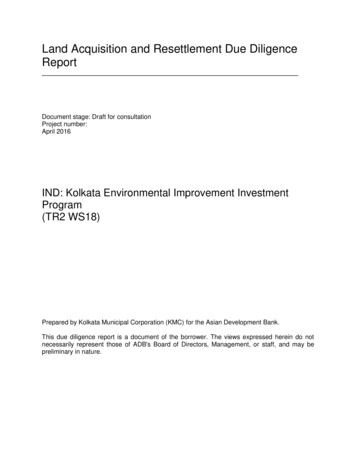
Transcription
Presenting a live 90-minute webinar with interactive Q&AFCPA Due Diligence in Mergers & AcquisitionsAssessing and Avoiding Pre-Closing Risks and Implementing Post-Closing Protection StrategiesTHURSDAY, DECEMBER 5, 20131pm Eastern 12pm Central 11am Mountain 10am PacificToday’s faculty features:Michael S. Diamant, Partner, Gibson Dunn & Crutcher, Washington, D.C.Edward J. Fishman, Partner, K&L Gates, Washington, D.C.Kathryn Cameron Atkinson, Member, Miller Chevalier, Washington, D.C.The audio portion of the conference may be accessed via the telephone or by using your computer'sspeakers. Please refer to the instructions emailed to registrants for additional information. If youhave any questions, please contact Customer Service at 1-800-926-7926 ext. 10.
Tips for Optimal QualityFOR LIVE EVENT ONLYSound QualityIf you are listening via your computer speakers, please note that the qualityof your sound will vary depending on the speed and quality of your internetconnection.If the sound quality is not satisfactory, you may listen via the phone: dial1-888-601-3873 and enter your PIN when prompted. Otherwise, pleasesend us a chat or e-mail sound@straffordpub.com immediately so we can addressthe problem.If you dialed in and have any difficulties during the call, press *0 for assistance.Viewing QualityTo maximize your screen, press the F11 key on your keyboard. To exit full screen,press the F11 key again.
Continuing Education CreditsFOR LIVE EVENT ONLYFor CLE purposes, please let us know how many people are listening at yourlocation by completing each of the following steps: In the chat box, type (1) your company name and (2) the number ofattendees at your location Click the word balloon button to send
FCPA Due Diligence in Mergers & Acquisitions:Pre-closing Due DiligenceMichael Diamant – Gibson, Dunn & Crutcher LLPmdiamant@gibsondunn.com202.887.3604December 5, 2013
Presentation Title/Client Name Successor LiabilitySuccessor liability poses great risk to would-be acquirors. U.S. courts recognize several theories that allow an acquiror to bearliability for the past illegal acts of an acquired entity. Under such principles of successor liability, an acquiror can inherit theFCPA liability of a target. U.S. enforcement agencies focus on FCPA issues that arise in thecontext of mergers and acquisitions—in recent years, approximatelyone-third of corporate FCPA enforcement actions have implicatedsuccessor liability issues.Relevant Considerations for entering a Deferred ProsecutionAgreement: “(a) following discovery of the FCPA violations duringthe course of acquisition-related due diligence, the Companyinitiated an internal investigation . . .”-Diebold, Inc. DPA, at 3 (October 22, 2013)5
Presentation Title/Client Name Successor Liability: Collateral ConsequencesAcquirors also may confront collateral consequences that can fatallyundermine the purpose of the transaction. The financial penalties can outstrip any revenue anticipated by theacquisition. Key personnel may need to be fired, seriously damaging the acquiredbusiness. As part of remediating any violation, the target may have to cancelsignificant contracts, including key customer and vendor relationships. As with any FCPA case, both the target and the acquiror can expectsignificant negative publicity. Also always consider: Once the target implements the control systemsof the acquiror, its business model may no longer be profitable.6
Presentation Title/Client Name The Government’s Consistent Warnings on M&A Due DiligenceDOJ seeks to impose successor liability “only when supported by the particular facts andcircumstances of the case and the law. [DOJ] does not hold acquirers strictly liable for theacts of their predecessors . . . [but] seek[s] to impose successor liability on a case-by-casebasis . . . .” For example, DOJ “formally declined” to prosecute a parent corporation “for anumber of reasons . . . , including because: (a) the parent corporation voluntarily providedinformation to the Department; and (b) the parent conducted extensive post-acquisition duediligence and training that gave rise to its discovery of the potential FCPA violations.”— Greg Andres, Deputy Assistant Attorney General, Criminal Division (June 16, 2011)The “nature and quality” of preacquisition due diligence is “one ofthe most critical factors” that DOJconsiders when making chargingdecisions in the M&A context.“Companies that fail to respond to red flagscan be held liable for the acts of their jointventure partners.”— Former SEC FCPA Unit Chief (Dec. 10,2010)— Former DOJ FCPA Unit Chief(Sept. 11, 2008)7
Presentation Title/Client Name M&A: Cautionary Tales – eLandia/Latin NodeA “cautionary tale” of what can happen when an acquiror conducts“little, if any, [FCPA] due diligence.”— Former DOJ FCPA Unit Chief (Nov. 17, 2009) In June 2007, eLandia acquired Latin Node, a telecom services provider.In August 2007, during a post-acquisition financial integration review, eLandiadiscovered evidence that Latin Node had paid approximately 2.25 million inbribes to Honduran and Yemeni government officials between March 2004 andJune 2007.eLandia voluntarily reported the payments to DOJ, eventually paying a 2million fine and placing Latin Node into bankruptcy.The first FCPA enforcement action based entirely on pre-acquisition conductthat was unknown to the acquiror when the transaction closed.eLandia’s entire 22 million investment in Latin Node reportedly wiped outdue to inflated acquisition price of corrupt company and investigation costs.8
Presentation Title/Client Name M&A: Cautionary Tales – Ball In 2011, the SEC alleged that Ball Corp. (“Ball”), a manufacturing companybased in the U.S., acquired Formametal SA, an Argentinian company that Balllearned had made illegal payments in the past.The SEC further alleged that Ball failed to institute sufficient compliancepolicies to prevent future bribery, and that Ball helped the Argentiniancompany cover up one of the payments by reclassifying it on its books.In 2011, Ball reached a settlement with the SEC for 300,000.Compliance take-away from the cautionary tales:– Acquisitions, mergers, and joint ventures carry risks of FCPA violations.Acquirors should conduct adequate due diligence on all potentialacquisitions and adequately respond to “red flags.”– New businesses resulting from transactions likely will require newcompliance policies, tailored to address specific situations.9
Presentation Title/Client Name M&A: Pfizer – A Case StudyPfizer H.C.P. In August 2012, DOJ entered into a DPA with Pfizer H.C.P., a subsidiary of PfizerInc. (“Pfizer”), to resolve charges that the company made more than 2 million inimproper payments to government officials in Bulgaria, Croatia, Kazahkstan, andRussia. The payments were made by a subsidiary that Pfizer H.C.P. acquired in 2003,Pharmacia & Upjohn (“Pharmacia”), from 1997 to 2006 to publicly employedhospital administrators, members of regulatory and purchasing committees, andother health care professionals to influence government decisions regarding theapproval and registration of Pfizer products, the award of pharmaceutical tenders,and the level of sales of Pfizer products. None of the Pfizer H.C.P. DOJ or SEC settlements mentions any FCPA-related duediligence, investigation, compliance or remediation efforts in connection withPfizer’s 2003 acquisition of Pharmacia & Upjohn (“Pharmacia”).– Thus, the agencies presumably held Pfizer liable for Pharmacia’s preacquisition conduct.10
Presentation Title/Client Name M&A: Pfizer – A Case StudyWyeth In a related action, Wyeth LLC (“Wyeth”), another subsidiary of Pfizer, entered into aDPA with the SEC to pay 18.8 million in disgorgement for FCPA violations of its ownsubsidiaries made both before and after its acquisition by Pfizer in 2009. Pfizer’s due diligence of Wyeth included conducting a comprehensive worldwide reviewof Wyeth’s compliance program and integrating Wyeth into its own internal controlsenvironment. Pfizer “undertook a risk-based FCPA due diligence review of Wyeth’sglobal operations” within 180 days of closing and sought to integrate Wyeth into Pfizer’sinternal controls environment.” Following Pfizer’s acquisition of Wyeth, Pfizer diligently and promptly integratedWyeth’s legacy operations into its compliance program, comprehensive worldwidereview of its compliance program and cooperated fully with SEC investigators. Pfizer’s and Wyeth’s timely disclosure of the improper payments and extensiveremedial measures supported the DPA. DOJ cited Pfizer and Wyeth’s thorough internal investigation and resolution with theSEC as factors influencing its decision not to pursue a criminal resolution for theimproper conduct of Wyeth’s subsidiaries prior to Wyeth’s acquisition by Pfizer.11
Presentation Title/Client Name Possible Limitations to Pre-closing Due Diligence Insufficient time to conduct a thorough due diligence review.Local legal restrictions that limit what information can be shared in advance ofclosing.If the acquiror and the target are in the same industry, access to information may berestricted to avoid running afoul of antitrust laws.In certain regulated industries, companies may not be able to share sensitiveinformation.Confidentiality obligations that run to third parties.Importantly, if the target has not maintained a robust anti-bribery complianceenvironment, it is possible that improper conduct has occurred undetected and thecompany’s internal control system has not even created an auditable paper trail ofsuch conduct that could provide identifiable red flags.Access to information can be delayed by a lack of internal communication betweenmanagement and employees responsible for compiling detailed information.12
Presentation Title/Client Name DOJ/SEC Guidance on M&A Due DiligenceA Resource Guide to the U.S. Foreign Corrupt Practices Act Issued jointly by SEC and DOJ on November 14, 2012. Issued in order to help businesses “better understand theFCPA.” The Resource Guide assembles, in one convenientplace, DOJ’s and SEC’s “guiding principles of [FCPA]enforcement.” The Guide is “non-binding, informal, and summary innature,” and “does not in any way limit the enforcementintentions or litigating positions” of U.S. enforcementauthorities.“Perhaps most commonly, inadequate due diligencecan allow a course of bribery to continue—with all theattendant harms to a business’s profitability and reputation,as well as potential civil and criminal liability.”-Resource Guide, at 6213
Presentation Title/Client Name DOJ/SEC Guidance on M&A Due DiligenceA Resource Guide to the U.S. Foreign Corrupt Practices Act The Resource guide stresses that due diligence is nopanacea:“DOJ and SEC evaluate whether the acquiringcompany promptly incorporated the acquiredcompany into all of its internal controls, including itscompliance program. Companies should considertraining new employees, reevaluating third partiesunder company standards, and, where appropriate,conducting audits on new business units.”- Resource Guide, at 62.“DOJ and SEC have only taken action against successorcompanies in limited circumstances, generally in cases involvingegregious and sustained violations or where the successor companydirectly participated in the violations or failed to stop themisconduct from continuing after the acquisition.”-Resource Guide, at 2814
Presentation Title/Client Name DOJ/SEC Guidance on M&A Due DiligenceFCPA Opinion Procedure Release 2008-02, cited in Resource Guide, at 29. Halliburton’s attempt to acquire British firm Expro International Group PLCresulted in DOJ’s release of a groundbreaking statement on an acquiror’ssuccessor liability for FCPA violations by a target company. DOJ agreed to grant Halliburton a 180-day grace period post-closing duringwhich Halliburton could self-report pre- and post-acquisition FCPA violationswithout itself being prosecuted, provided Halliburton adhered to a stringentpost-acquisition due diligence and integration plan. In detailing the procedures that Halliburton must follow in order to avail itselfof the protection afforded by 2008-02, DOJ has set forth its view on “bestpractices” for post-acquisition compliance integration. DOJ reserved the right to proceed against Expro for any FCPA violations; DOJstated that it does not intend to pursue any enforcement action against Halliburton.15
Presentation Title/Client Name DOJ/SEC Guidance on M&A Due DiligenceBest Practices for Post-acquisition Compliance Integration Immediately upon closing, imposing the acquiror’s Code of Business Conducton all the target’s operations and meeting with DOJ to discuss whether theinformation that the acquiror has learned to that point shows potential preacquisition FCPA violations; Within 10 days of closing, preparing and presenting to DOJ a comprehensiveFCPA due diligence work plan that addresses and categorizes each of thefollowing into high-, medium-, and low-risk elements: use of third-partyrepresentatives, commercial dealings with state-owned customers, jointventures, teaming or consortium agreements, customs and immigration matters,tax matters, and government licenses and permits; Utilizing in-house resources, outside counsel, and third-party consultants (e.g.,forensic accountants) as appropriate to conduct post-acquisition due diligence,including a review of the target’s e-mails and financial records and interviewsof legacy employees;16
Presentation Title/Client Name DOJ/SEC Guidance on M&A Due DiligenceBest Practices for Post-acquisition Compliance Integration (Continued) Requiring legacy third-party representatives that the acquiror intends to usepost-acquisition to sign new contracts with Halliburton that incorporate auditrights and FCPA and other anti-corruption provisions; Providing FCPA training to legacy employees “whose positions or jobresponsibilities warrant such training on an expedited basis” within 60 days ofclosing and providing such training to all other employees within 90 days; and Disclosing to DOJ all “FCPA, corruption, and related internal controls andaccounting issues that it uncovers during the course of its 180-day duediligence.”17
ESSENTIAL ELEMENTS OF FCPA DUEDILIGENCE IN M&A CONTEXTPrepared for:Strafford Publications CLE ProgramDecember 5, 2013Edward J. FishmanK&L Gates LLP1601 K Street, NWWashington, DC 20006
Key Objectives of Buyer FCPA Due Diligence Assess risk of historical and ongoing FCPAviolations by target Evaluate buyer’s successor liability risk Determine adequacy of target’s FCPA complianceprogram Incorporate diligence into M&A negotiations andpost-closing integration plans19
Typical Sources of Due Diligence Information High-level interviews with senior management oftarget and compliance team Due diligence questionnaire focused on FCPA risks Review of data room documents relating to FCPArisks Financial due diligence on internal controls,disbursements, petty cash and other processes Third party agent reviews (questionnaire, desktopreviews, interviews)20
High-Level Risk Assessment Considerations Business Presence in Higher-Risk Jurisdictions Extent of Sales to Government Customers Level of Interactions with Regulatory Officials Type of Sales and Business Model Extent of Third Party Agent Network Nature of Marketing and Relationship BuildingPractices21
Target’s FCPA Policies and Procedures Determine whether target has written FCPA policiesand procedures Evaluate sufficiency of those FCPA policies andprocedures Assess whether policies and procedures arefollowed and understood Evaluate effectiveness of training program22
Interactions with Foreign Government Officials Sales to Foreign Government Customers Extent of Sales in High-Risk Jurisdictions Nature of Sales Channel to Government Customers (direct,through sales agents, through distributors, as part of aconsortium, etc.) Level of Regulatory Interactions with Government Officials Customs clearanceLicensingFacility InspectionsTax AuditsLitigation Settlements23
Travel, Gift and Entertainment Practices Extent of marketing and relationship building activity withgovernment officials and other business partners Sponsored travel to conferences, seminars or facility visits Gift-giving practices associated with holidays, family or otherevents Meals, entertainment and hospitality practices Transparency of expenditures and sufficiency of supportingdocumentation required by target Review and approval process for different types of travel, gift andentertainment expenses Cash advancesPer diemsReimbursement to employeesReimbursement to government officialsDirect payments to vendors24
Political and Charitable Contributions Extent of Political Activity (directly or throughlobbyists or other advocacy groups) Connections with local politicians Importance of maintaining good relationships withlocal government Extent of Charitable Activity Purpose and magnitude of charitable giving Possible connection with business objectives25
Target’s Internal Financial Controls Evaluate adequacy of target’s internal financialcontrols and related policies and procedures Gain understanding of how transactions areapproved, financed and recorded in books andrecords Determine whether any “off-the-books” funds areused and for what purposes Examine petty cash practices26
FCPA Compliance History Prior Violations by or Investigations of Target Desktop Diligence Review Court records search Any prior investigations, suspicions or media reports? Reputation of Key Principals Desktop Diligence Review Background and reference checks Any red flags?27
Third Party Agent Risk Identify and Assess Level of Risk Associated with DifferentTypes of Intermediaries Sales AgentsDistributors or ResellersCustoms BrokersConsultants, Lawyers, Accountants, Lobbyists Design Due Diligence Review of Third Parties Based on RiskAssessment Desktop Review for low-risk agents Full interviews for higher-risk agents based on jurisdiction,amount of revenues and nature of interactions with governmentofficials28
Questions?Edward J. FishmanK&L Gates LLP1601 K Street N.W.Washington, D.C. 20006(202) 778-9456 (direct)ed.fishman@klgates.com29
Mergers & Acquisition DueDiligence: Challenges and BestPracticesKathryn Cameron AtkinsonMiller & Chevalier CharteredStrafford WebinarDecember 5, 2013
M&A Due Diligence: Compliance andCoordination M&A-related compliance program elements becomingstandard as new requirements from Bizjet appear inData Systems, Nordam, Tyco, et al. Due diligenceReporting on due diligence findingsIntegration – policies, trainingAuditing31
M&A Due Diligence: Special Considerations Transaction may not permit ideal due diligenceapproach: AuctionHostile bidAntitrust concernsOther restrictions Halliburton Release: DOJ will tolerate but discouragerestrictions on pre-acquisition due diligence DOJ: If lack of access outside your control, mustconduct post-acquisition due diligence32
M&A Due Diligence: Be Prepared As soon as possible in a transaction, obtain written safeguards to ensure rights to due diligence and to map out response to issuesPush to maximize pre-closing accessMine public data sources: news articles, websites, NGOsConsider retention of outside investigators/business intelligenceConsider whether/how lack of pre-closing access should affectdecisions: Safeguards Personnel decisions Corporate structure decisions33
M&A Due Diligence: Be Prepared Consider in advance how you will handle a violation of anticorruption laws discovered during due diligence: A “materially adverse effect” giving the buyer the right toterminate or renegotiate the merger agreement? Indemnities? Escrow? Change in transaction value? Consider in advance pros/cons of disclosure, OpinionProcedure34
M&A Due Diligence: Be Prepared Consider in advance possible report structure, butmaintain flexibility: Oral report to Board? Comprehensive written report? Close dialogue throughout: do not wait until you’re done May have multiple reports: pre- and post-closing35
M&A Due Diligence: Recent Lessons Recent enforcement actions raise the bar on postclosing actions, whether or not pre-closing duediligence was “thorough” Expectation of thorough post-closing due diligence Expectation of post-closing training, audits Equal focus on pre- and post-closing behavior36
M&A Due Diligence: Recent Lessons Watts Water (2011) Issues evident in pre-closing due diligence, butcommunication gaps between in-house personnel andexternal counsel Improper conduct left unaddressed post-closing Slow movement post-closing (3 years) Grace period is short: months, not years37
M&A Due Diligence: Recent Lessons Ball/Formametal (2011) 3 months post-acquisition, accountant discoveredquestionable payments at Formametal Reported to management Response insufficient to stop payments SEC: Post-acquisition due diligence undertaken, butresponse insufficient Ball liable for the conduct38
M&A Due Diligence: Recent Lessons Pfizer’s Tale of Two Acquisitions:Risk-based FCPA due diligence review, reported within 180 days of closingPost-acquisition review identified potential improper paymentsInvestigated, disclosed resultsPromptly integrated Wyeth’s legacy operations into its compliance programDespite these efforts, post-closing improper payments by Wyeth, no PfizerknowledgeDOJ explicitly credited Pfizer Inc. for its acquisition-related due diligence relatedto Wyeth, no criminal enforcement action against Pfizer Inc. for the preacquisition payments Pfizer DOJ DPA and SEC complaint do not include Wyeth’s improperpayments, which were resolved in a separate settlement with Wyeth.39
M&A Due Diligence: Recent Lessons Pfizer’s Tale of Two Acquisitions: April 16, 2003, Pfizer stock-for-stock acquisition of Pharmacia Corporation SEC Complaint: Pfizer Russia continued and expanded a Pharmacia Russia practice of paying sales discounts owed to Russian distributors into offshorebank accountsIn 2003 and 2004, Pfizer Russia entered into similar arrangements for thebenefit of two other Russian distributorsFrom 1997- 2004, Pfizer HCP Croatia, Pharmacia Croatia made payments andprovided benefits to doctors employed by the Croatian governmentAlthough Pfizer HCP Croatia ended stopped most payments, it permitted theprogram to continue with respect to one Pharmacia product until 2005DOJ and SEC held Pfizer Inc. liable for pre- and post-acquisition payments40
M&A Due Diligence: Recent Lessons Diebold Pre-acquisition due diligence of two distributors foundevidence of bribes to employees of privately-held banks Regional and corporate management learned of thebribes and killed the deals, but continued relationshipwith distributors for 1-3 years without further remedialaction Charged as civil and criminal FCPA violations underbooks and records provisions 48.1 million in fines, penalties, disgorgement 3-year DPA, monitor imposed41
M&A Due Diligence: Best Practices Maximize pre-acquisition access and due diligenceefforts Best way to reduce risk, value deal, and prepare forintegration Position defenses as early as possible Prioritize post-acquisition due diligence Don’t assume you know everything Move quickly on program integration Training, audits Policy implementation42
M&A Due Diligence : Best Practices When a violation is discovered: Move quickly to address Ensure response is thorough and effective Document response If agencies involved, proper planning and executionwill affect prosecutorial discretion Declination Enforcementagainst target company only Enforcementin name of target, fines paid by purchaser Self-reportingv. monitor43
Questions?Kathryn Cameron AtkinsonMiller & Chevalier Chartered655 Fifteenth Street NWSuite 900 Washington, DC 20005katkinson@milchev.com(202) 626-595744
successor liability for FCPA violations by a target company. DOJ agreed to grant Halliburton a 180-day grace period post-closing during which Halliburton could self-report pre- and post-acquisition FCPA violations without itself being prosecuted, provided Halliburton adhered to a stringent post-acquisition due diligence and integration plan.
